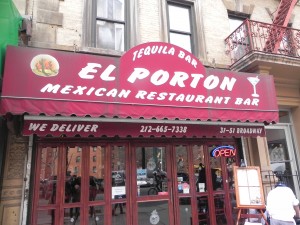When walking through the streets of West Harlem, diversity and cultural infusion are two key factors that are undeniably present. Within this area, there are a variety of different cultures and businesses that cater to these groups and niches outside of their comfort zone. One can tour around West Harlem and wander off into a buffet of different varieties of food. You can get a taste of real authentic soul food at Miss Maude’s SpoonBread Too, or some Italian Cuisine at Cucina Italiana. It is the ability to enjoy such different cuisines, within the same location that makes West Harlem such a main attraction. Different restaurants, different foods, different people- this all adds up to a multicultural experience.
Between 124st and 125th st on 3151 Broadway is located “El Porton Bar” Mexican restaurant one of the food stops which I made. With the large white words “El Porton” plastered on a red banner above the restaurant, one instantly recognizes that this eating place is one in which Latin food is served, specifically Mexican food. Before even entering the restaurant, one is given a glimpse of what your taste buds can desire with a menu located right in front of the entrance. Interestingly enough the menu seems to contain plates that somehow infuse Mexican ingredients, with entrees that may attract non-Mexicans perhaps something caused by the gentrification taking place within West Harlem. An example of this is the “Jalapeno Burger” that combines a known Mexican spice, with more of an American entrée. Instead of using regular hamburger bread, they try to infuse the “mexicanness” by using “Mexican white bread and fries”. After reading this menu, my instantaneous question was whether or not this restaurant was going to be catering simply to Hispanics, solely Mexicans, or were they trying to target non-Mexicans , those who are strangers to this culture?
El Porton Bar, tries to put an emphasis on the fact that it sells authentic Mexican food. According to them, one should come here to eat if “you are looking for real Mexican food and not the type that obviously comes from gringos loose in the kitchen.” The name “el porton” derives from the Preclassic MesoAmerican Mayan civilization, used to represent a large inscribed wooden door. The message they attempt to make with this name, is that “el porton”, the door is open to all. This sense of “openness” is an interesting feature to have, especially in West Harlem. It comes to mirror an important statement West Harlem attempts to make and it is that this is a community of not only one race or culture. It is a community infused with African Americans, Caucasians, and most recently, Hispanics.
When entering El Porton they want to make clear that this is a Mexican Restaurant. With Mexican music playing in the background, Hispanic servers working in the lighted tequila bar, and serving the food, they try to help others understand what being Mexican may represent. The indoor decoration is not overwhelming nor does it scream “Mexican”. There is a clear balance in attempt to try to show some of the Mexican flag colors, but intertwine it with modern and hip architecture. The table setting is simple as they try to gear our focus to the large portions of food and drinks which are served. It is done to such detail, that I think its main purpose is to reach to those who are not Mexican, to make them understand what this implies. Again, this is done in a way in which Mexican culture is infused with that of American. A simple glance at the menu allows one to see how this restaurant is not solely for Mexicans or Hispanics, but it targets an even wider audience, one who comes to this restaurant to experience something new. For an instance when describing tamales, its description is given in English and described with sensational words such as “steamed packers of corn dough wrapped in corn leaf with a savory chicken or beef. Choice of green or red sauce”. The price of the meals vary from moderate to expensive. Ultimately, El Porton appears to mediate between both defining what the Mexican culture authentically represents, and how it hopes to come across to Non-Mexicans. Its customers for the most part are Non-Mexican, yet it does continue to have its small loyal Mexican customer base.
In the end, El Porton Bar seems to live up to its name and have its doors open for everyone. Its place in West Harlem comes to show the grand significance of cultural diversity and infusion. Its physical location mirrors this, as it is positioned in the same street in which a sushi place, Irish pub, Middle Eastern Cuisine restaurant, and Chinese takeout eatery are situated. With all things considered, El Porton Bar highlights the multi-ethnicity and global taste buds of the people within this community, and those who are strangers to it.



